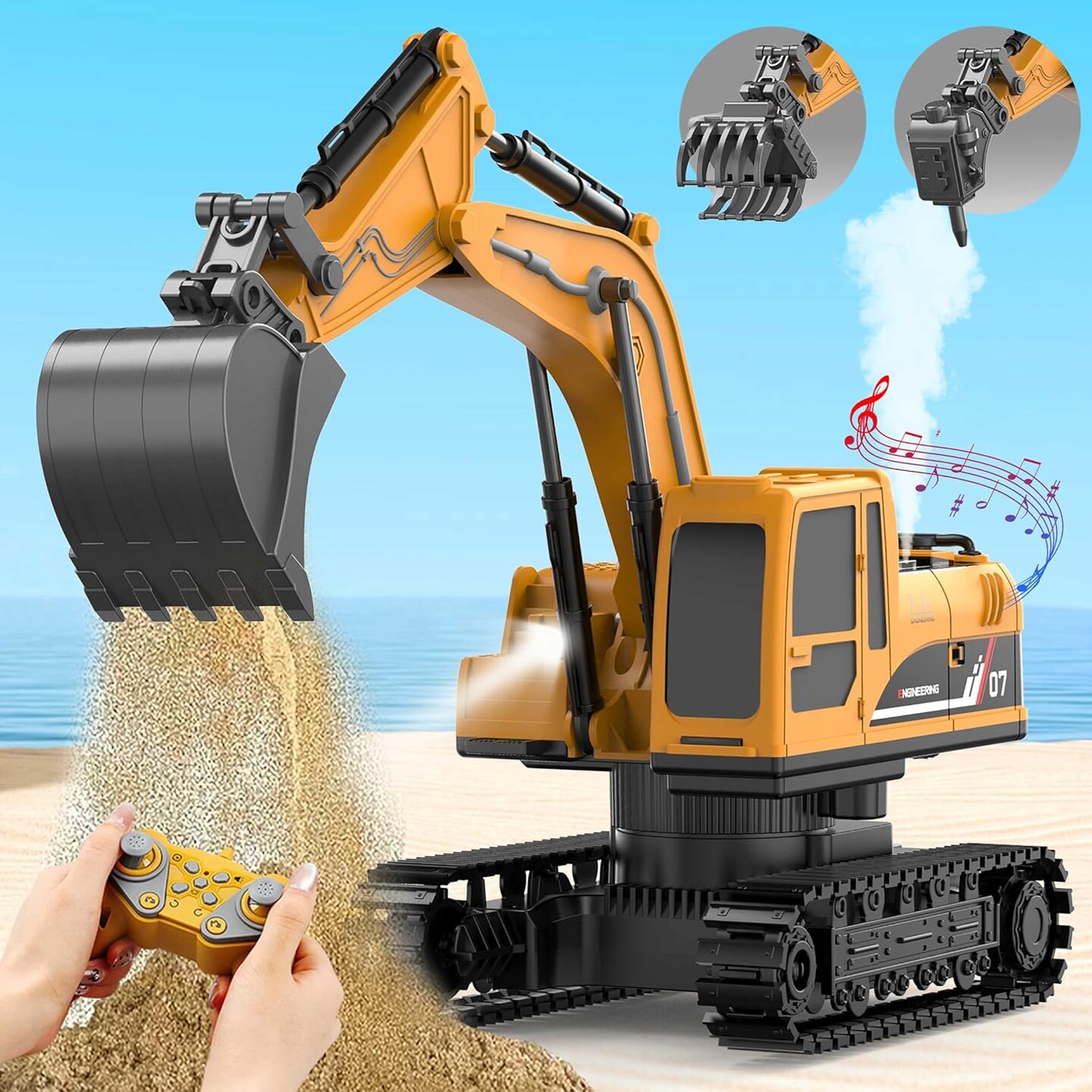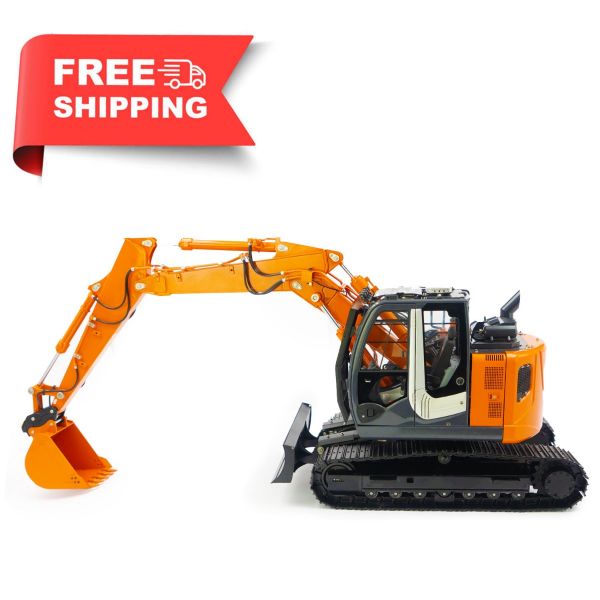Discover the Importance of Excavator in Modern Building Projects
Excavators are essential devices in contemporary building jobs. Their adaptability allows them to execute a large range of jobs, from digging and grading to demolition and website prep work. Advanced features, such as hydraulic attachments and GPS, improve their abilities and effectiveness on task sites. As the industry develops, the importance of excavators expands also more. Understanding their function can expose insights into the future of building and construction methods. What exists in advance for these machines?
The Adaptability of Excavators in Numerous Projects
Although excavators are frequently connected with large-scale building and construction tasks, their adaptability permits them to be used in a wide variety of applications, from domestic landscaping to energy maintenance. In urban settings, excavators can browse limited rooms to dig structures for homes or set up drain systems. Their ability to perform delicate jobs makes them excellent for landscape design tasks, where they can excavate for ponds or plant trees. In addition, excavators play an important function in energy maintenance, efficiently excavating trenches for pipelines or cable televisions without disrupting bordering areas. In agricultural applications, they aid in land clearing and soil preparation. Additionally, their adaptability allows them to be furnished with various add-ons, enhancing their capability throughout various tasks. This multifaceted nature of excavators not just simplifies different building procedures but likewise demonstrates their indispensable duty in contemporary facilities advancement and maintenance.
Key Attributes and Kinds of Excavators
The discussion on crucial features and kinds of excavators highlights the important characteristics that make these devices invaluable in building and construction. Different excavator kinds, each developed for particular tasks, show their flexibility and efficiency across various applications. rc excavator. Recognizing these classifications and functions is essential for optimizing their usage in modern-day building tasks
Excavator Keys In Overview
Excavators play a crucial role in modern building and construction, using versatility and effectiveness throughout various jobs. These heavy equipment units been available in several types, each tailored for certain applications. The most typical types consist of spider excavators, known for their security on irregular terrain, and rolled excavators, which supply better movement on smooth surface areas. Mini excavators are favored for small tasks and tight spaces, while long-reach excavators are designed for deep digging. Additionally, there are customized excavators, such as hydraulic excavators, which enhance power and precision. Each kind features special capabilities, making them important for jobs ranging from digging and grading to demolition and product handling. Understanding these variations allows building and construction experts to choose the right excavator for their job needs.
Trick Features Explained
Comprehending the key attributes of excavators boosts their reliable application in building and construction tasks. Excavators are identified by their powerful hydraulic systems, which offer the needed pressure for digging, training, and relocating materials. Their articulated arms enable a broad variety of motion, facilitating precise operations in constrained areas. Furthermore, the selection of add-ons, such as pails, grapples, and augers, increases their versatility to meet different job requirements. The size and weight of excavators also add to their stability and maneuverability on various surfaces. Additionally, developments in innovation have brought about the combination of GPS and automation, enhancing accuracy and effectiveness in excavation tasks. These attributes collectively position excavators as indispensable tools in modern building and construction.
Applications in Building
Changing building sites, excavators play a pivotal function throughout different applications, ranging from domestic structure tasks to massive infrastructure growths. These flexible makers are furnished for tasks such as digging structures, trenching for utilities, and website grading. Various kinds of excavators, consisting of spider, wheeled, and mini excavators, supply certain benefits tailored to the job needs. Spider excavators master harsh terrains, while wheeled excavators provide mobility on paved surface areas. Miniature excavators are perfect for confined spaces, making them prominent in city setups. The performance and power of excavators substantially accelerate building and construction procedures, making certain timely task completion. Their versatility additionally improves their significance, enabling building groups to tackle a varied array of obstacles effectively.
Enhancing Performance and Productivity on Work Sites
Making best use of performance and productivity on task sites is a critical purpose in contemporary building and construction. Excavators play a critical function in accomplishing this objective by enhancing various tasks. Their capability to carry out multiple features-- such as digging, lifting, and grading-- minimizes the requirement for additional equipment, consequently saving time and resources.Moreover, excavators improve process by enabling for faster completion of jobs. With innovative features like hydraulic attachments and general practitioners technology, they can implement specific procedures that reduce errors and rework. This precision not just enhances the quality of job yet additionally enhances material use, adding to set you back savings.The flexibility of excavators allows them to adapt to various site conditions, making sure that projects progress smoothly no matter challenges. By integrating excavators right into construction procedures, teams can substantially increase their overall performance, bring about timely task completion and boosted profitability.
Security Advantages of Using Excavators
Excavators substantially enhance safety on construction sites with improved operator presence and decreased hand-operated labor dangers. By offering operators with a clear view of their environments, excavators help to stop crashes and injuries. Furthermore, the equipment decreases the requirement for workers to take part in unsafe hand-operated tasks, further advertising a more secure job setting.
Boosted Driver Exposure
Building websites can be disorderly and filled with potential dangers, basics boosted driver exposure plays an important duty in making certain safety when using excavators. Modern excavators are designed with large, unobstructed home windows and purposefully put mirrors, enabling operators to keep a clear view of their environments (rc excavator). This enhanced exposure is vital for detecting pedestrians, other machinery, and various obstacles, considerably reducing the risk of crashes. In addition, many excavators incorporate advanced technology, such as video cameras and sensing units, to provide operators with extra viewpoints, further improving understanding. The ability to see even more clearly not just help in efficient procedure but additionally fosters a more secure job environment, making it less complicated for operators to browse complicated building and construction sites without endangering safety requirements
Lowered Handbook Labor Risks
When manual labor is lowered via making use of excavators, many safety and security benefits emerge, considerably boosting the well-being of building employees. Excavators minimize the physical pressure associated with heavy lifting and recurring tasks, efficiently lowering the risk of musculoskeletal injuries. By automating procedures such as digging, grading, and moving products, they allow employees to maintain a safer range from possible hazards. Additionally, excavators are outfitted with advanced security functions, such as rollover security systems and boosted driver functional designs, which additionally safeguard workers on website. The result is a substantial reduction in work environment crashes and injuries, causing enhanced performance and morale among building and construction teams. Eventually, the adoption of excavators adds to a much safer and much more reliable construction atmosphere.
Excavators in Earthmoving and Site Prep Work
In modern building, a significant part of earthmoving and website preparation tasks depends on the effectiveness and adaptability of excavators. These makers are created to manage different dirt kinds and surface, making them crucial for grading, excavating, and trenching tasks. Their hydraulic arms can be outfitted with different add-ons, such as containers and augers, enabling operators to customize their technique based upon particular project requirements.Excavators stand out at moving large volumes of planet rapidly and successfully, which increases the total construction timeline. They can navigate limited rooms and testing sites where conventional devices might have a hard time, boosting productivity. Furthermore, the precision of excavators warranties that site preparation complies with rigorous specs, reducing the risk of mistakes that might cause expensive rework.
The Duty of Excavators in Demolition Tasks
Excavators play a necessary role in demolition tasks, as they possess the power and dexterity required to dismantle frameworks effectively. Equipped with different accessories such as hydraulic breakers, shears, and grapples, these equipments can adapt to various demolition requirements, whether for small structures or big industrial websites. Their convenience makes it possible for operators to deal with complex projects while preserving safety and precision.In enhancement to their demolition capacities, excavators help with debris removal, ensuring that job websites continue to be organized and risk-free. By breaking down frameworks right into manageable items, they enable streamlined clearing and recycling of materials, lining up with modern-day sustainability efforts.Moreover, excavators can access limited spaces and browse irregular surface, making them crucial in metropolitan demolition tasks. Generally, their robust style news and multifunctionality make excavators an essential possession in the demolition stage of construction, contributing substantially to task timelines and efficiency.


Future Patterns in Excavator Modern Technology and Use
As the building sector develops, developments in excavator innovation are poised to change their usage and efficiency considerably. One significant fad is the combination of automation and artificial knowledge, enabling excavators to run with marginal human treatment. This shift will certainly improve precision in tasks such as grading and trenching, lowering human error and increasing productivity.Additionally, helpful site the increase of hybrid and electric excavators is forming an extra sustainable construction setting, decreasing carbon discharges and gas prices. Enhanced telematics systems are also emerging, allowing real-time monitoring of device efficiency and maintenance needs, which can result in much better functional efficiency and longer tools lifespan.Moreover, developments in accessory innovation are increasing the convenience of excavators, enabling them to perform a wider variety of tasks. The combination of these trends shows a future where excavators are smarter, greener, and more adaptable, ultimately reshaping building and construction task characteristics.
Regularly Asked Inquiries
Just How Do Excavators Compare to Various Other Construction Machinery?
Excavators, characterized by their versatility and power, succeed in digging and earthmoving compared to other machinery. Their capability to execute different jobs, consisting of training and demolition, makes them important in building and construction jobs, enhancing overall efficiency.

What Is the Average Life-span of an Excavator?
The typical life-span of an excavator typically varies from 7,000 to 10,000 operating hours, depending on maintenance, usage conditions, and design. Correct care can expand this lifespan, making certain peak efficiency throughout its functional years.
Exactly How Are Excavators Kept for Optimal Efficiency?
Excavators call for routine upkeep for peak performance, consisting of routine examinations, fluid checks, filter substitutes, and prompt repairs. Implementing a precautionary maintenance routine assists lengthen their life-span and warranties reliable procedure in numerous building and construction settings.
What Are the Prices Connected With Renting Out vs. Purchasing an Excavator?
The expenses related to acquiring an excavator versus renting out differ considerably. Leasing deals lower upfront costs but can collect over time, while buying calls for a substantial preliminary financial investment, however gives long-term financial savings and possession possession benefits.
What Training Is Required to Run an Excavator?
Operating an excavator calls for specialized training, commonly including security methods, maker operation methods, and ecological awareness. Qualification programs typically mandate useful experience, enabling drivers to manage different jobs successfully while ensuring conformity with market guidelines. The most usual kinds consist of spider excavators, known for their stability on irregular surface, and wheeled excavators, which give better flexibility on paved surfaces. Small excavators are favored for limited areas and small projects, while long-reach excavators are created for deep digging. Additionally, there are customized excavators, such as hydraulic excavators, which improve power and accuracy. Various kinds of excavators, including spider, rolled, and mini excavators, provide particular benefits customized to the project requirements. Spider excavators succeed in rough terrains, while wheeled excavators use flexibility on smooth surfaces.